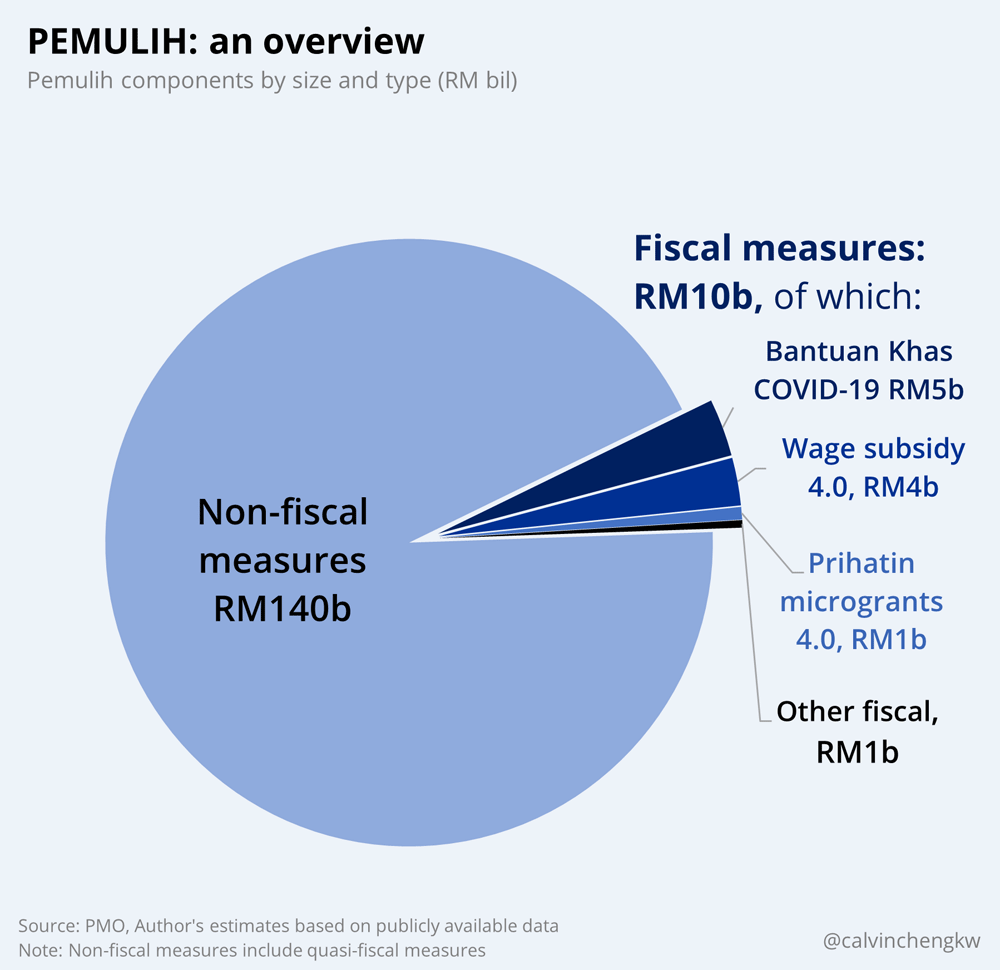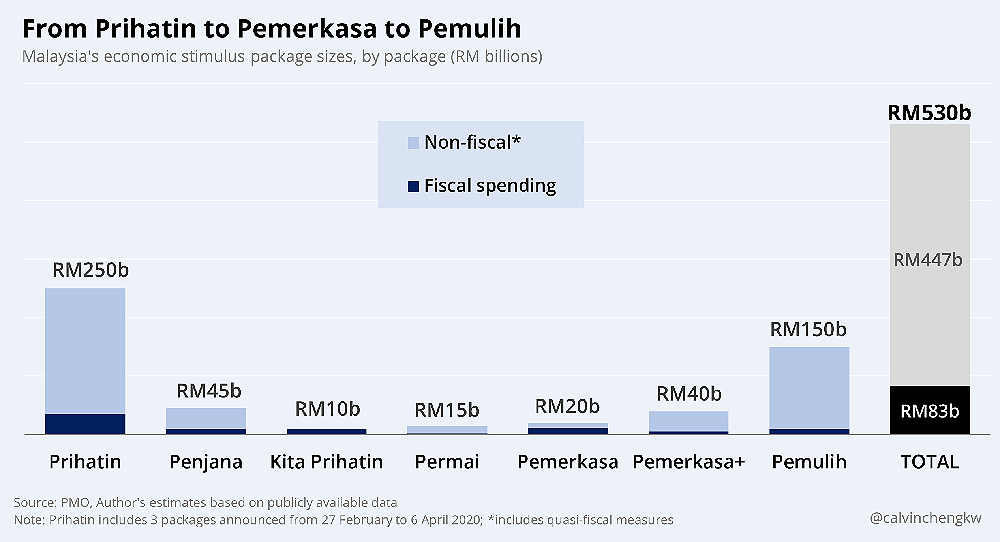The announcement of Malaysia’s Pemulih package of a supposed RM150 billion (only RM10 billion in actual fiscal spending) illustrates a disconnect with realities on the ground and, more fundamentally, a lack of understanding of what is necessary to move Malaysia out of the crisis it is facing.
With short-term framing and focused on a political recovery for a floundering administration rather than needed economic stimulus, job growth and stronger sustainable social safety net, the package is largely more of the same with yet another label. Unfortunately, at a height when the pain of a damaged economy is severe, the gap between what is required and what is being provided is larger than ever.
More of the same
While any relief is welcomed at a time of need, this package contains the same elements of the past - cash handouts, subsidies on petrol, electricity, data and wages, EPF withdrawals of individual’s own savings, deferred insurance and opt-in interest suspension of consumer loans in the form of a six-month moratorium.
The individual amounts allocated are very low and the periods they will last are limited, if at all, given outstanding debts, depletion of savings and daily spending needs. Ultimately the loans will come due and the funds allocated will run out, leaving Malaysians in a similar place they currently are - dependent on assistance and hurting.
The cash transfer funds in Bantuan Khas (RM5 billion) and wage subsidies (RM4 billion) are grossly inadequate to cover needs in an economy with growing inflation and after a period where large shares of the population have been denied the right to earn a living through a reliance on lockdowns rather than a holistic pandemic recovery strategy.
The initiatives follow the pattern set with the first package based on a premise of limited and targeted government spending with a focus on surviving a difficult period of economic hardship. Spending on food baskets best illustrate the “feed only” thinking. This is not just about hunger, but systemic malnourishment of a society that needs a proper diet of policies for recovery.
Wrong assumptions
The alleviation measures are conceived as short-term for a Covid-19 pandemic that has been both long and deep. The assumption is that things will improve with time through a band-aid approach - an assumption that has repeatedly not materialised in the six different relief packages (Prihatin, Penjana, Kita Prihatin, Pemerkasa, Pemerkasa+) that have come before this one - is wrong.
Covid-19 is now an endemic problem that even the slowly-delivered vaccinations will not “solve”. Interventions require long-term thinking and sustainable solutions that learn the lessons from the past.
Equally important is the idea that people will be happy, even “grateful”, of the minimalist relief measures. Now, after seven packages, it has not sunk home that short-lived measures only receive short-lived support. When funds are quickly spent, they are forgotten as the problem of inadequate means to make a living for families remain and with it the frustrations and anger return, even more intensely than before.
New measures needed
Allow me to highlight seven important observations (for seven measures so far) on areas needing attention:
1. This is less than 10 percent of the country’s GDP. Budget 2021 was primarily focused on paying for the cost of government and additional support for health. It did have important measures for key sectors but taking out operating costs, the amount focused on stimulating the economy and relief were less than RM100 billion (US$25 billion). By comparison, Singapore, with a similar-sized economy, has spent over S$100 billion (RM300 billion) during the pandemic.
While much of this is also similar in composition in that Singapore’s interventions include short-term relief measures, the fiscal spending there has been much more considerable and included skills training and with greater support for key economic sectors.
Importantly, more of their policy interventions have a longer vision, recognising that half-hearted spending (like half-hearted lockdowns) will have a minimal effect.
2. Pemulih’s targeting has missed the target. The focus should be on job creation and strengthening incomes, with the relief measures complementary as a bridge to when Malaysians can have secure incomes. Little thought has been put into how spending measures will position the economy in a world where Covid-19 is endemic.
3. The relief package has ignored many of the most in need without an appreciation that not all Malaysians at different incomes are facing the same circumstances. Excluding the informal sector, the packages leave out those among the most vulnerable - the unemployed, workers and students.
Young entrants - very hard hit - have received inadequate support. There has been little appreciation of regional differences, gender dimensions or recognition of generational issues in making allocations.
4. Minimalist cash transfers are not a sustainable social safety net. Measures should not be one-off but regularised over time through institutionalised programmes that are properly reviewed and implemented based on their effectiveness in providing support.
5. Many of the relief measures are too far down the road. The assistance of Bantuan Khas Covid-19 starts only in August; the grants of Geran Khas Prihatin 4.0 only start in September, while the extra unemployment assistance under Perkeso begins in October. The situation is serious now - actually yesterday! There is no real sense of urgency of the seriousness of current needs.
6. The spending lacked (and still lacks) oversight. Worries have repeatedly been expressed about a need for spending to be reviewed to assure that funds are genuinely reaching those in need rather than those with networks.
7. Finally, the programmes are not premised on the view that the structure of Malaysia’s economy and its social safety net programmes need meaningful reform. Until there is a hard look at how money is being spent, the patronage leakages with an eye to where Malaysia will need to be ahead, the government is locking itself in old patterns.
Old practices are not helping. Malaysians are hurting - badly. The pain is unprecedented as businesses close and savings rapidly erode. Pemulih supposedly rests on the idea of a recovery, but it does not provide a clear path to do this.
Sadly, the focus is trying to recover political support - with appeals to a traditional base and with an assumption that people (especially in the rural areas) will not see through the rhetoric.
This is the seventh package that has failed to deliver the sustainable support Malaysians need. It is a mistake to assume that Malaysians do not realise this. Given the intensity of suffering on the ground, the political boost will likely be as short-lived as the others. - Mkini
BRIDGET WELSH is a senior research associate at the Hu Fu Centre for East Asia Democratic Studies and a senior associate fellow of The Habibie Centre. She currently is an honorary research associate of the University of Nottingham, Malaysia's Asia Research Institute (Unari) based in Kuala Lumpur. She tweets at @dririshsea.
The views expressed here are those of the author/contributor and do not necessarily represent the views of MMKtT.






No comments:
Post a Comment
Note: Only a member of this blog may post a comment.